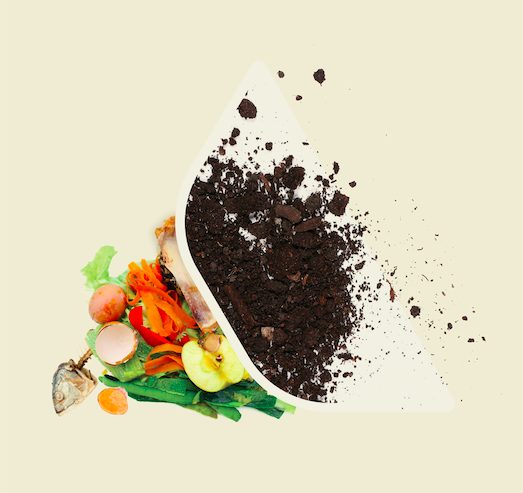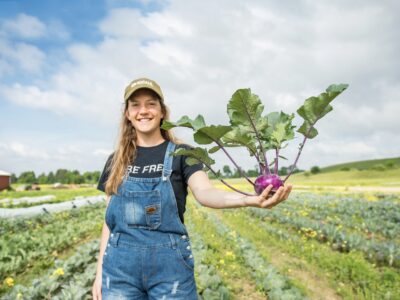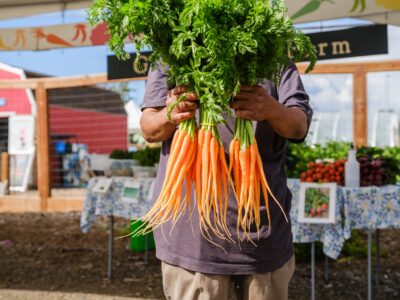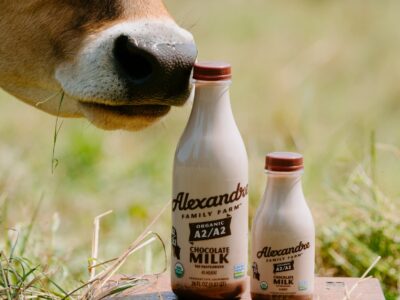(Bloomberg) —
In the northeastern suburbs of Paris, amid a cluster of multi-story residential blocks, a 19-year-old, chestnut-colored horse named Queteur du Clos is in the middle of his regular waste-collection duties.
“Queteur, let’s go, come on,” says Alexandrine Martin, his minder, who is sitting on a cart loaded with brown trash cans being dragged along by the slow-moving giant.
Twice a week, the workhorse transports organic waste produced by about 10,000 local residents from a number of pick-up points to a nearby processing hub that turns it into compost. Queteur, who previously plied vineyards in France’s Jura region and now lives in an urban farm outside Paris, was chosen for his low-carbon credentials.
“We even compost his poop,” laughs Martin, pointing to a sack hanging behind him.
Martin’s employer and Queteur’s, as it were, is Les Alchimistes, a startup spearheading a French revolution that is turning organic waste into “black gold.” Since 2016 the company — which mostly carries out collections by e-bike and electric vehicle, despite the odd horse — has collected and composted biomass like expired food and garden waste from customers including restaurants, supermarkets, schools, hospitals, florists and private households. After launching in Paris, it now operates in 12 cities including Lyon, Nantes and Marseille.
At Les Alchimistes’ hubs, organic waste is weighed, sorted, crushed, blended with wood chips and then added to mechanical turners. The entire process takes three to four months, compared to 12 to 18 months in natural conditions. The compost, certified to what’s known as the NFU 44 051 standard, is mostly sold in bulk to farmers, but is also available for individuals to buy in 2-liter bags.
Read More: Can You Compost That? A Cheat Sheet on What Goes in the Bin
“The future is a compostable one,” says Maïwenn Mollet, the company’s head of research and development. “There’s no sense in throwing away this material. It is not waste; it has real value. If we want to create a circular economy, we must reuse it.”
Organic waste is a fast-growing phenomenon that until recently has been overlooked. In France, 249 kilograms (549 pounds) of residual household waste is now generated per person every year, double the quantity four decades ago, with food waste accounting for about a third of that. Much organic matter is mixed with general waste and sent to incinerators or landfills. When it decomposes in landfills, organic waste produces more of the greenhouse gas methane, which, in the short term, is dozens of times as potent as CO2 at trapping heat in the atmosphere.
Read More: Nest Co-Creator Wants You to Pay $33 a Month Not to Trash Your Food
The United Nations estimates food waste is responsible for 8% to 10% of greenhouse gas emissions. However, 80% of this waste could be reused if sorted and treated, according to a report last year by the French Court of Audit.
Composting organic matter brings a number of ecological benefits, advocates say, by reducing waste-management costs, climate emissions and the use of chemical fertilizers, and helping to enrich the world’s hugely degraded soils.
“To not send this organic waste back into the ground [through composting], where it came from, is actually to break from the natural order,” says Pauline Debrabandere, campaigns coordinator for the nonprofit Zero Waste France. “In France, we have been specialists in incineration. But it’s abhorrent to do that. We must stop.”
The French government included the reuse of biodegradable matter in its goal to create a less wasteful nation. As part of the so-called “anti-waste law,” which was passed in 2020, all local authorities across the country will be required to collect organic waste from households beginning next year, whether that is carried out by enterprises like Les Alchimistes or through other means. Since January, it has been mandatory for private companies producing at least 5 tons of organic waste per year to recycle it.
“It’s an important development,” says Jocelyn Blériot, policy executive lead at the Ellen MacArthur Foundation. “France is definitely one of the frontrunners when it comes to reusing organic waste, even if it doesn’t hit the target from the outset.”
Working out logistics, sourcing the appropriate containers and learning how to prevent problems like contamination will require time, meaning France “might need to show some leniency at the beginning,” adds Blériot.
But the government must explicitly outline what implementation of the legislation looks like, Debrabandere says. “The law just says sorting organic waste is obligatory,” she notes. “But does that mean at source or at the composter? And how many composters should there be in a city of 300,000? It needs to be specified.”
The Ministry of Ecology said in a statement to Bloomberg Green that the government plans “strong actions,” including a large-scale public information campaign in the fall, to help achieve its target. As of the end of 2022, 14.5 million people across France were served by a sorting system for organic waste.
Read More: Would You Compost Your Underwear?
For now Les Alchimistes is looking to increase its output from a trot to a canter. A social enterprise, it has received public subsidies as well as €2.4 million from impact investors in 2020. In February it raised a further €10 million, and it aims to expand to a total of 30 French cities, turning 10% of all organic waste into compost, with no more than 10 kilometers between where waste is collected and processed.
Working with French diaper manufacturer Celluloses de Brocéliande, the company is also piloting a program to create and use compostable diapers. The anti-waste law includes a target to make disposable sanitary textiles recyclable by 2024.
The pilot, known as Fertile Diapers, is currently working with 13 nurseries across Paris. Over time, the team has tweaked the composting recipe — which includes Brewer’s spent grain, a brewing byproduct — and has removed tape from the diaper design. By next year, Les Alchimistes plans to roll the program out to 100 Parisian nurseries and another large city in France.
‘The first version [of the diaper] wasn’t very absorbent,” says Océane Gurhem, deputy director of Babilou Pantin Vélizy Nursery, which joined the pilot last year. “But over time, they made it better. Even if it was a little difficult at the start, it’s a good system.”
Completing the full circle of reuse of organic matter, students at École du Breuil, a horticultural school in eastern Paris, are testing compost derived from those diapers and human waste to grow produce like strawberries, tomatoes and salad greens.
“When it came to tasting the produce, some people refused,” says Marie Monjauze, the school’s director of development. “It might take people time to adjust, even if it is completely safe and healthy. But that’s okay.”
© 2023 Bloomberg L.P.





